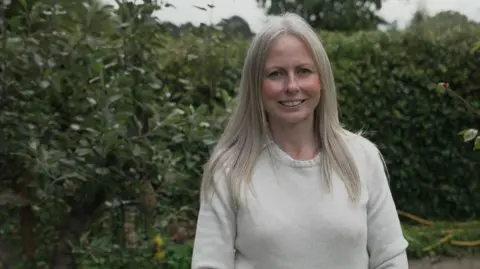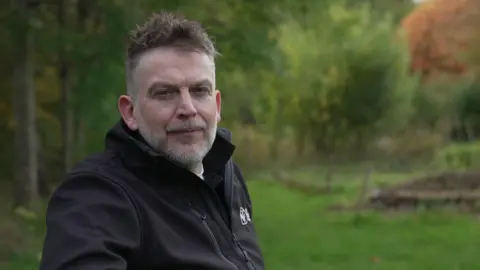Malcolm Prior and Jenny KumahBBC News rural affairs team
 Andy Alcroft/BBC
Andy Alcroft/BBCFor Emily Hough, nature was too often simply something “out there”, a world apart from her, a view from a hospital window.
Years spent in and out of specialist mental health units in Birmingham and London, being treated for the eating disorder she had had since the age of 12, meant she felt little connection with the countryside or interest in the everyday flora and fauna around her.
That was until five years ago, when a hospital occupational therapist gave her an unusual prescription: Grow a sunflower.
“I’ll be honest I’d never planted anything in my life,” Ms Hough said.
“But I planted that sunflower and, just watching it grow, from me watering it and from me protecting it from the shade, helped me feel connected for the first time and really be able to appreciate what was around me – and how I can make a difference to nature and what nature can actually do for me.
“I was in a hospital at that point, so it was very limited. Fast forward five years, here we are today.”
 Getty Images
Getty ImagesFrom those early roots, Ms Hough, now 35, embraced what is formally called by the NHS “green social prescribing”, where GPs and health practitioners refer patients to organisations that offer nature-based activities, whether that be hiking, birdwatching, rockpooling or looking after a city-based allotment.
It is supposed to complement other more mainstream treatments and therapies and has been a key part of the government’s 10-year plan for the NHS in England.
The scheme may not work for everyone but for Ms Hough, who has now relocated from Solihull to a life in the countryside, the benefits have been profound.
She is now out of hospital and has become what the NHS calls an “Expert by Experience” (EbE) – someone who uses that experience to design and evaluate new health services.
She helped shape the Royal Society for the Protection of Birds (RSPB)’s flagship “nature prescription” scheme for the West Midlands, launched earlier this year.
On Friday – World Mental Health Day – the scheme marks the training of its 100th health professional, with enough resources to support 1,000 patients accessing nature-based activities.
 Andy Alcroft/BBC
Andy Alcroft/BBCBut the future of green social prescribing is uncertain.
Despite a four-year national pilot that ended in March being judged a success by an independent evaluation of its first two years, there is concern that the onus for funding these schemes is being left to charities.
Organisations, including The Wildlife Trusts, the RSPB and the Ocean Conservation Trust, are calling on the government to commit more funding to nature prescription schemes and to roll them out, beyond their initial seven trial areas.
Dom Higgins, head of health and education for The Wildlife Trusts, said: “It is unequivocal that nature improves mental health.
“I think the time for questioning the evidence is really over and people within the system and the NHS and decision makers get this.
“It’s just we need the mechanism to make it available everywhere. It’s time to seriously fund prevention and opportunities for people to create good health in the neighbourhoods where they live and work.”
The national pilot scheme saw nearly 8,500 people prescribed nature activities in its first two years, with more than half those patients living in socio-economically deprived areas.
Chris Dayson, professor of voluntary action, health and wellbeing at Sheffield Hallam University, who was part of the team that evaluated the scheme, said it brought “a really statistically significant increase in wellbeing” for patients.
The evaluation also found the scheme brought an economic social return – not least of all by getting people back into work – of £2.42 for every £1 invested.
When approached by the BBC, the government did not comment on the future of green social prescribing but said the evaluation of the second two years of the trial scheme would be published “in due course”.
‘Dramatic results’
Although green social prescribing is designed to complement, not replace, conventional medical treatments and therapies, there are some who fear it does not deal with the bigger social health issues around mental health.
Rob Poole, professor of social psychiatry at the Centre for Mental Health and Society, said that, while he was not against green social prescribing, it was an “inadequate response to the social determinants of health, such as poor housing, poverty and deterioration in social infrastructure”.
“These are not lifestyle choices. They cannot be addressed by time-limited interventions, no matter how much better green activity makes you feel in the short run,” he said.
But Shannon Kang, an NHS health and wellbeing coach at the University Medical Practice in Birmingham, who has recently been trained in nature prescribing by the RSPB, said she had seen “dramatic results” – with patients’ anxiety and stress levels reduced.
For Ms Hough, getting in touch with the natural world has been life-changing: “I was sceptical. For years I had walked around not appreciating nature. But I genuinely believe that nature has really helped save me. It has given me hope.”
If you have been affected by any of the issues raised in this article help is available via the BBC’s Action Line page.



